What opportunities does Brazil’s G20 Presidency offer for libraries and the issues that matter to us? We’re happy to share an overview of the priorities already set out, and what they mean for our institutions.
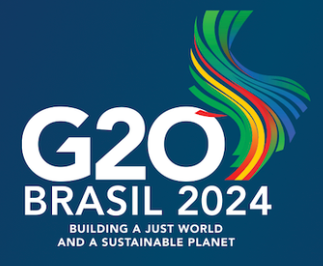 Already on 1 December 2023, Brazil took over the presidency of the G20, the group of 20 of the largest economies in the world, providing a space for discussing, coordinating and launching joint initiatives.
Already on 1 December 2023, Brazil took over the presidency of the G20, the group of 20 of the largest economies in the world, providing a space for discussing, coordinating and launching joint initiatives.
G20 members are Argentina, Australia, Brazil, Canada, China, France, Germany, India, Indonesia, Italy, Japan, Mexico, Russia, Saudi Arabia, South Africa, South Korea, Turkey, the UK, the US and the European Union, plus others invited on an ad hoc basis.
The G20 works though two high-level tracks. One brings together the ‘sherpas’ or representatives of heads of state and government, ahead of a summit in November, and oversees a group of 15 working groups, two task forces and an Initiative. The other is the finance track, with Finance Ministers and central bank governors, who discuss key economic issues.
In his speech at the G20 Summit in India, President Lula underlined a strong focus on equality, and in particular combatting hunger worldwide, as well as accelerating sustainable development in general. He was also strong in calling for reform of international financial institutions.
But what can libraries expect in different areas of activity over the course of 2024, and how could we get involved as part of wider efforts to secure recognition, and so support? This article looks at some key areas.
Digital Economy: the Digital Economy Working Group is in its fourth year, and focuses on how to harness the potential of digital to deliver wider policy goals. The Brazilian Presidency has set out four themes – connectivity (in particular in rural and remote areas), digital government (including through high-equality eGovernment services and Digital Public Infrastructure), information integrity (focused on the action of platforms), and artificial intelligence (looking at how to take a truly global approach to AI, not just one based on the situation of a limited number of countries and actors).
There is lots for libraries in here, in particular around the role of public access in libraries as part of the wider inclusive connectivity infrastructure, and how libraries can support information integrity by building both skills to navigate the information environment, and appreciation of quality information. Libraries also have much to contribute to making eGovernment work, and to the Digital Public Infrastructure debate (see our briefing). The Ministerial meeting will be on 14 September.
Culture: this is also the fourth year of operation of the Culture Working Group, which brings together culture ministers and equivalents. The existence of the working group in itself is helpful, showing that culture has its place as an area of action in the context of efforts to deliver on a wider policy agenda. Work under the Indian Presidency led to a powerful endorsement of culture as a development goal.
Broad themes for work this year, building on the work of the Indian Presidency, include cultural diversity and inclusion; culture, digital environment and copyright; culture and sustainable economic development; and preservation, safeguarding and promotion of cultural heritage.
For libraries, it will be valuable to push for further affirmation of the role of culture in development, as well as cultural rights (including rights of access to culture), in line with the overall emphasis on inclusion in President Lula’s speech. A particular goal will be to see a broader definition of culture, including of course libraries, and not just the narrow museum and heritage sector. The Ministerial meeting will be on 18 October.
Education: work here overall is strongly focused on education professionals and how to help students realise their potential. Priorities here seem to focus on addressing the shortage of personnel, as well as their training, diversity and representation in the sector, and opportunities for cross-border exchange and learning. The Presidency also notes questions around connectivity, digital tools in the classroom and school management, online training, and adapting curricula to technology are on the agenda.
For libraries, a key priority will be to underline the fact that librarians should be considered as education professionals, with a key role in supporting literacy (and literacies), and more broadly helping students to succeed. Our field would also, doubtless, benefit from inclusion in wider discussions about ongoing learning, and can offer much on making digital education work effectively, while respecting privacy. The Ministerial meeting will be on 30-31 October.
Research and innovation: this is a new working group, set up by the Brazilian Presidency, with ‘Innovation Open to Fair and Sustainable Development’ as the key theme. This is admittedly more about technology access and transfer to developing countries, based on concerns that technology is too often linked to competition between countries, rather than collaboration to find solutions. In addition, the working group is also looking to support student and researcher mobility, and enable inter-institutional collaboration.
For libraries, it will be helpful not only to ensure understanding of the place of libraries at the heart of universities and research institutions, but also to underline that key to promoting the exchange of ideas, collaboration and capacity is the spread of open science. The lessons of the Japanese G7 work on the topic in 2023 could be a good basis. The Ministerial meeting will be on 17-18 September.
An interesting element of this work is the Bioeconomy Initiative, with a strong focus on how to bring together and disseminate relevant knowledge in order to allow for more sustainable use of biodiversity and to understand and maximise its role in promoting sustainable development.
Development: issues on the agenda for the Development Working Group are social inclusion and reduction of inequalities, and in particular ensuring that everyone has access to basic sanitation. There is also a call for cooperation between groups focused on development and finance in order to boost spending on sustainable development.
The G20 agenda on development is likely to be very broad, but there is potential, in underlining the importance of information equity, and how action on this can help to combat wider inequalities. There are also possibilities, in demonstrating how libraries can help spread knowledge and change behaviours around sanitation, to make a case for including us in any plans and programming. There should, in the context of the Global Alliance against Hunger and Poverty, be scope to underline the need to build community institutions with the connections and understanding to help communities in the most effective way possible. The Ministerial meeting will be on 23 August.
There are potential openings in other areas. The Employment Working Group’s focus on keeping skills updated (especially for women and others at risk of marginalisation) at a time of technological change relates well to much library work in communities to build digital skills and inclusion. While the new Task Force for the Global Mobilisation against Climate Change is more focused on economics and wider action, it will be valuable to highlight libraires’ support for climate empowerment in communities.
Similarly, the Task Force for a Global Alliance Against Hunger and Poverty is extensively about improving financial support and incentives, but the role of libraries in sharing innovation in rural communities is relevant. Meanwhile, initial proposals on health, focused on unified and resilient systems, currently focus on coordination and collaboration, but realistically could and should include a universal right of access to health information.
Furthermore, there are other areas – tourism, women’s empowerment and disaster risk where little information on plans is available, but where there is scope for libraries to engage.
Finally, we will be following work as it emerges around the different engagement groups focusing on specific topics of communities, and which for the first time will come together in a ‘Social Summit’ just before the Leaders’ Summit in November. The list of such groups includes areas relevant to libraries, not least the Urban20 meeting of mayors, and the Civil20 (for civil society) and P20 (for parliaments).
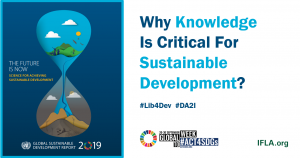 The
The 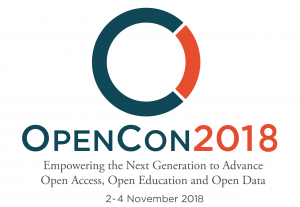 The Open Access movement is not standing still. Alongside the successes, there are also major questions and even concerns about inclusion, sustainability and whether it is achieving its original goals.
The Open Access movement is not standing still. Alongside the successes, there are also major questions and even concerns about inclusion, sustainability and whether it is achieving its original goals. 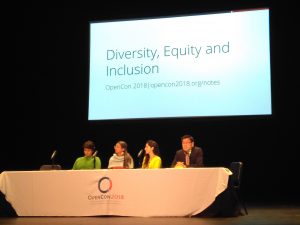 This is one of the most-favoured panels in OpenCon, which goes back to its very essence. It is based on the fact that “while the Open Access, Open Data, and Open Education movements often lean on rhetoric around social justice, equity, and the democratization of knowledge, in many ways, the movements continue to marginalize underrepresented scholars and students. Mainstream efforts to advance Open centre digital solutions and dominant (often Western) ways of knowing”.
This is one of the most-favoured panels in OpenCon, which goes back to its very essence. It is based on the fact that “while the Open Access, Open Data, and Open Education movements often lean on rhetoric around social justice, equity, and the democratization of knowledge, in many ways, the movements continue to marginalize underrepresented scholars and students. Mainstream efforts to advance Open centre digital solutions and dominant (often Western) ways of knowing”.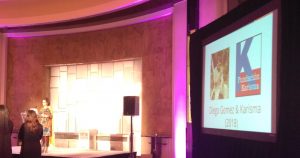 The next generation leadership award is given each year to a person who helped advance significantly open access, open science or open education in its country, region or internationally. This year’s award went to Diego Gómez, a biologist who faced criminal charges for sharing an article. Fundación Karisma, who offered him support throughout the trial and spread the word internationally, collected the award. More information is available in
The next generation leadership award is given each year to a person who helped advance significantly open access, open science or open education in its country, region or internationally. This year’s award went to Diego Gómez, a biologist who faced criminal charges for sharing an article. Fundación Karisma, who offered him support throughout the trial and spread the word internationally, collected the award. More information is available in 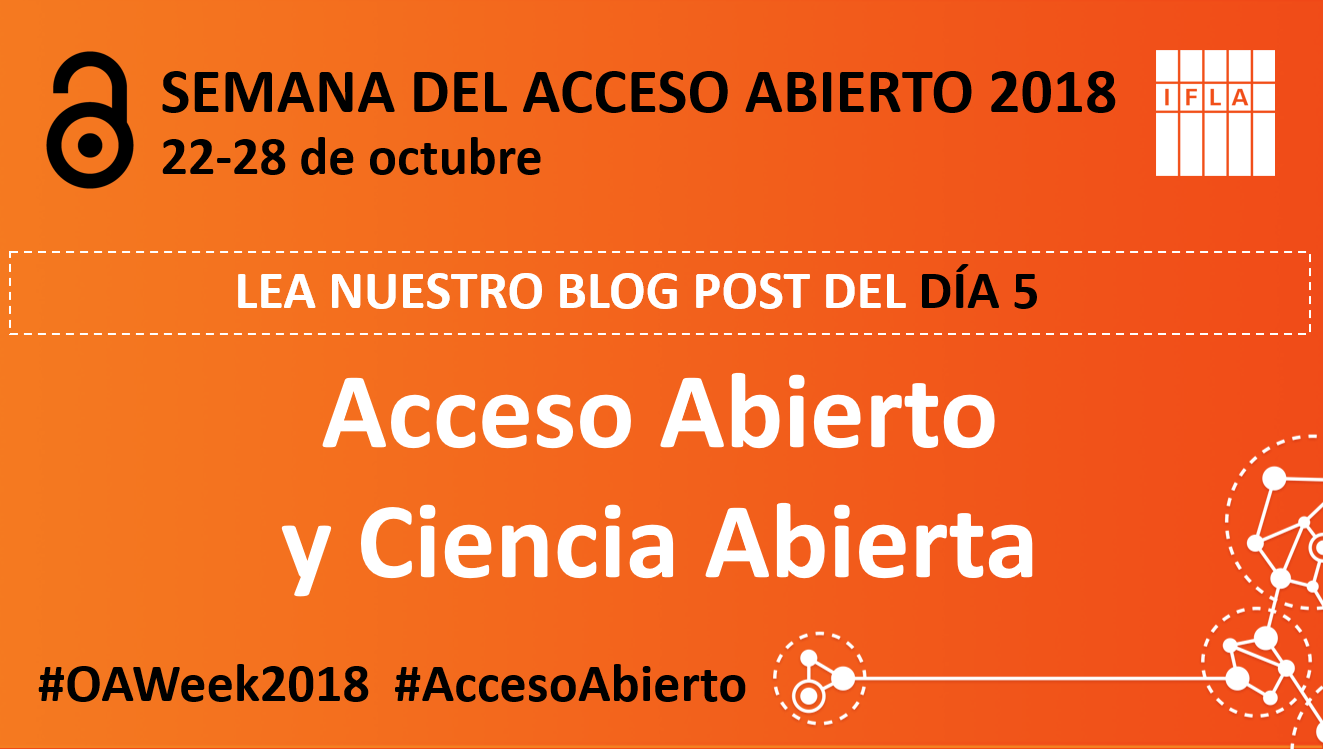
![By Petr Knoth and Nancy Pontika [CC BY 3.0 (https://creativecommons.org/licenses/by/3.0)], via Wikimedia Commons](https://blogs.ifla.org/lpa/files/2018/10/Os_taxonomy-300x165.png)